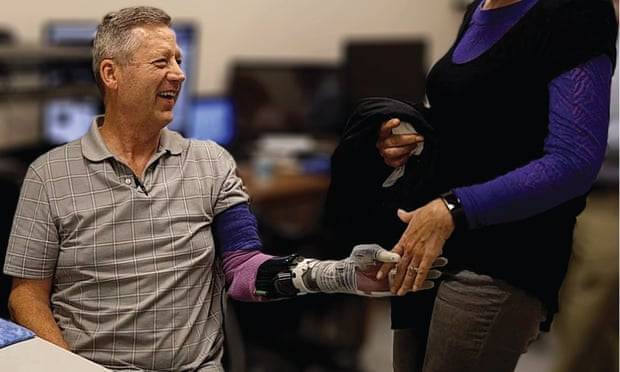A Robotic Hand Gives Back An Amputee The Sense Of Touch

The last couple of months and weeks have been full of marvelling news concerning the strides that researchers intend to make in the world of science with the integration of modern-day technology. And this latest news may very well be among if not the peak headlines. A man who unfortunately lost his arm 17 years ago has been given back the ability to feel things through the help of a robotic prosthetic arm that is brain-controlled.
The American patient, Keven Walgamott, who had his arm amputated after an accident has been part of an experiment that has given him back the ability to feel 119 touch sensations through the robot arm as if it were his own natural limb.
As reported of now, he can successfully differentiate large, small, soft and hard objects when blindfolded, and handle delicate objects such as grapes and eggs quite well. And yes, the everyday stuff like putting on a ring, operating his phone or peeling banana are activities he can now do without a bother.

The robotic hand and wrist that has been in development for the last 15 years, involves implantation of electrodes to the remaining part of his arm to allow communication between the prosthetic and his brain. The hand can now move in six directions and is equipped with 19 sensors that detect touch and positioning.
The arrays responsible detect and interpret the signals sent to Keven’s arm nerves from his brain and the data is transported to a computer outside his body to translate it to digital information.
The computer then instructs the prosthetic to move as the user intends. This is also a two-way passage as the arrays also provide Keven’s arm nerves with computer-generated signals that can then be interpreted by his brain.
The seemingly successful experiment done by a team at the University of Utah waspublished stating that one of the goals was to supply the patient’s brain with electrical signals that are quite similar to those that would be sent by nerves from a human hand. According to the lead author of the paper, Dr Jake George, communicating with the body in the body’s natural language makes the information more useful.
With such a major milestone already achieved, the team’s goal does not end there as they intend to expand the sensory information available to the wearer, including pain and temperature (in other words, upgrade it).
And even since the current prototype requires the use of a stationary computer, they have reported to be developing a more portable version that test users will hopefully be able to carry home in the next two years.
According to Dr George, one of the main challenges alongside the technical hurdles has been “trying to convince insurance companies that this new tech is going to be worth the money.”
But with the witness from users like Walgamott that have had it first-hand, we might be hopeful that the breakthrough serves as evidence for the personal and psychological benefits brought by the prosthesis.
And however all this is possible, there happens to be slight opposition from fellow scientists who think that the emotional aspect of this advanced technology is not something that should be dwelt much on.
“This technology would benefit from rigorous psychosocial research on the users’ emotional responses,” says Dr Sarah Wilkes, a researcher who wasn’t involved in the prosthesis.“In our work on material preferences in prosthetics, we interviewed 32 prosthetics users about their relationship with their limb.”
“We found that silicone rubber – the most commonly used material in prosthetics – was very divisive: about half of the users liked it but the others hated it, and that’s problematic. This shows that it’s important that new technologies are centred around the needs and desires of the end-users.”
But this very much contradicts Keven’s statement when asked why he chose to be a test user, saying, “I have friends who are double hand amputees. I get along quite well with just one hand, but they could certainly use the help. For them and for future people, I went ahead and did it. I hope this work will provide a springboard to future enhancements for prosthetic hand use.”
So is this going to change lives? We believe it might very well do.